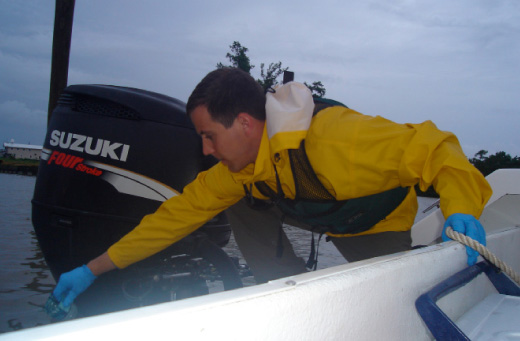Testing the Gulf Waters

It’s not easy to get in touch with Michael Dirks 10MPH these days.
He spends 10 to 12 hours at a time on a boat in the Gulf of Mexico. Back on land, he’s in Venice, Louisiana, at the bottom of the Mississippi Delta, where Internet service is hard to come by.
Dirks is one of the thousands of people working on the BP oil spill. He was deployed in June by a private consulting firm to assist with the Natural Resource Damage Assessment involving federal and private agencies. BP subcontracted with Dirks’ firm to gather field data and carry out environmental impact assessments on the oil spill with a focus on restoration.
As part of a rapid response team, Dirks collects samples of surface oil on the water. Samples are sent to a lab to determine if the oil is from the BP spill or one of thousands of other oil rigs in the Gulf. Their findings will be used in legal proceedings and will only be available when the study is completed. No end date has been set.
Dirks prepared for deployment by poring over various websites and contacting experts recommended by the RSPH Department of Environmental Health. A number of courses he took as a student prepared him for his assignment, including hazard assessment, risk assessment, and toxicology. The Geographic Information System skills that he learned helped him understand the sampling plan and boat navigation systems.
He was surprised and impressed at how organized the operation has been, even from the outset. Crews go out every morning, as long as the weather permits. “If the swells are larger than four feet, the boat captains usually decide it’s unsafe for sampling,” he says. “In that case, we go on standby to catch up on paperwork or purchase materials. When the weather is good, we’re out on the water from sun-up to sundown. Our crew is awesome. There are people from all over the U.S., including geologists, ecologists, and technical field experts.”
After less than a month on the job, Dirks was named a team leader. His new duties include briefing the command center on their daily progress and training new crew as they come aboard.
“That’s something I learned at Rollins too,” he says. The lesson: “Step up to the plate as soon as you become part of a new team to make suggestions and improvements to the research process.”—Carol Pinto


